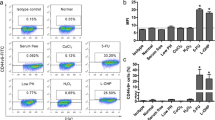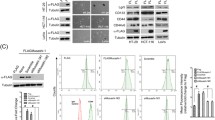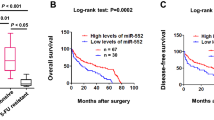Abstract
Chemotherapy resistance of colorectal cancer stem cells (CRC-SCs) has become a major challenge in clinical treatment of cancer. Methionine restriction (MR) enhances the therapeutic effect of chemotherapeutic agents. The aim of this study was to explore the molecular pathways that MR affects the chemotherapeutic sensitivity of CRC-SCs. CD133+ and CD133– SW480 or SW620 cells were isolated by magnetic-activated cell sorting (MACS). Mouse xenograft tumor model was established by subcutaneous inoculation of CD133+ SW480. MTT assay was used to detect cell viability. Phase distribution of cell cycle was detected by flow cytometry. Western blotting was used to detect drug-resistant related protein expression. miR-320d and transcription factor c-Myc expressions were detected by qRT-PCR. The interaction between miR-320d and c-Myc was verified by luciferase assay. CD133+ SW480 and SW620 cells were more resistant to 5-fluorouracil (5-FU) than CD133– cells. In vitro and in vivo experiments showed that 5-FU and MR combined therapy further inhibited CD133+ cell activity and ATP binding cassette subfamily G member 2 (ABCG2) expression, and reduced tumor volume compared with drug administration alone. Interference with miR-320d or overexpression of c-Myc reversed the increased chemotherapeutic sensitivity of CRC-SCs induced by synergistic therapy with 5-FU and MR. miR-320d can target and regulate c-Myc. Interference with c-Myc could reverse the increase in cell viability and ABCG2 expression caused by down-regulation of miR-320d. In conclusion, the combined chemotherapy with MR can enhance the chemotherapeutic sensitivity of CRC-SCs by up-regulation of miR-320d to inhibit c-Myc expression, which lays a molecular basis for MR regulation of chemotherapeutic sensitivity of CRC-SCs.







Similar content being viewed by others
Data availability
The datasets used and/or analyzed during the current study are available from the corresponding author on reasonable request.
References
Zalewski A, Snook AE, Waldman SA (2021) Stem cells as therapeutic targets in colorectal cancer. Pers Med 18:171–183. https://doi.org/10.2217/pme-2020-0099
Zhang L, Lu Y (2018) MiR-449b inhibits the migration and invasion of colorectal cancer cells through the negative regulation of MMP2. Clin Surg Res Commun 2:27–33
Jaspan V, Lin K, Popov V (2021) The impact of anthropometric parameters on colorectal cancer prognosis: a systematic review and meta-analysis. Crit Rev Oncol Hematol. https://doi.org/10.1016/j.critrevonc.2021.103232
Zhou Y, Xia L, Wang H, Oyang L, Su M, Liu Q, Lin J, Tan S, Tian Y, Liao Q, Cao D (2018) Cancer stem cells in progression of colorectal cancer. Oncotarget 9:33403–33415. https://doi.org/10.18632/oncotarget.23607
Reya T, Morrison SJ, Clarke MF, Weissman IL (2001) Stem cells, cancer, and cancer stem cells. Nature 414:105–111. https://doi.org/10.1038/35102167
Kozovska Z, Patsalias A, Bajzik V, Durinikova E, Matuskova MJBC (2018) ALDH1A inhibition sensitizes colon cancer cells to chemotherapy. BMC Cancer 18:656
Xin L, Liu L, Liu C, Zhou L-Q, Zhou Q, Yuan Y-W, Li S-H, Zhang H-T (2020) DNA-methylation-mediated silencing of miR-7-5p promotes gastric cancer stem cell invasion via increasing Smo and Hes1. J Cell Physiol 235:2643–2654. https://doi.org/10.1002/jcp.29168
Guo HY, Lishko VK, Herrera H, Groce A, Kubota T, Hoffman RM (1993) Therapeutic tumor-specific cell-cycle block induced by methionine starvation in-vivo. Can Res 53:5676–5679
Komninou D, Leutzinger Y, Reddy BS, Richie JP Jr (2006) Methionine restriction inhibits colon carcinogenesis. Nutr Cancer-an Int J 54:202–208. https://doi.org/10.1207/s15327914nc5402_6
Zimmerman JA, Malloy V, Krajcik R, Orentreich N (2003) Nutritional control of aging. Exp Gerontol 38:47–52. https://doi.org/10.1016/s0531-5565(02)00149-3
Orentreich N, Matias JR, Defelice A, Zimmerman JA (1993) Low methionine ingestion by rats extends life-span. J Nutr 123:269–274
Wanders D, Hobson K, Ji X (2020) Methionine restriction and cancer biology. Nutrients. https://doi.org/10.3390/nu12030684
Gao X, Sanderson SM, Dai Z, Reid MA, Cooper DE, Lu M, Richie JP Jr, Ciccarella A, Calcagnotto A, Mikhael PG, Mentch SJ, Liu J, Ables G, Kirsch DG, Hsu DS, Nichenametla SN, Locasale JW (2019) Dietary methionine influences therapy in mouse cancer models and alters human metabolism. Nature 572:397. https://doi.org/10.1038/s41586-019-1437-3
Vodenkova S, Buchler T, Cervena K, Veskrnova V, Vodicka P, Vymetalkova V (2020) 5-fluorouracil and other fluoropyrimidines in colorectal cancer: past, present and future. Pharmacol Ther. https://doi.org/10.1016/j.pharmthera.2019.107447
Corra F, Agnoletto C, Minotti L, Baldassari F, Volinia S (2018) The network of non-coding RNAs in cancer drug resistance. Front Oncol. https://doi.org/10.3389/fonc.2018.00327
Yu Y, Nangia-Makker P, Farhana L, Rajendra SG, Levi E, Majumdar APN (2015) miR-21 and miR-145 cooperation in regulation of colon cancer stem cells. Mol Cancer. https://doi.org/10.1186/s12943-015-0372-7
Yu X-F, Zou J, Bao Z-J, Dong J (2011) miR-93 suppresses proliferation and colony formation of human colon cancer stem cells. World J Gastroenterol 17:4711–4717. https://doi.org/10.3748/wjg.v17.i42.4711
Ulimann P, Nurmik M, Schmitz M, Rodriguez F, Weiler J, Qureshi-Baig K, Felten P, Nazarov PV, Nicot N, Zuegel N, Haan S, Letellier E (2019) Tumor suppressor miR-215 counteracts hypoxia-induced colon cancer stem cell activity. Cancer Lett 450:32–41. https://doi.org/10.1016/j.canlet.2019.02.030
Sun B, Fang Y-T, Jin D-J, Chen Z-Y, Li Z-Y, Gu X-D, Xiang J-B (2019) miR-194 inhibits the proliferation of SW620 colon cancer stem cells through downregulation of SSH2 expression. Cancer Manage Res 11:10229–10238. https://doi.org/10.2147/cmar.S221150
Zhang H, Li W, Nan F, Ren F, Wang H, Xu Y, Zhang F (2011) MicroRNA expression profile of colon cancer stem-like cells in HT29 adenocarcinoma cell line. Biochem Biophys Res Commun 404:273–278. https://doi.org/10.1016/j.bbrc.2010.11.106
Ouyang S, Zhou X, Chen Z, Wang M, Zheng X, Xie M (2019) LncRNA BCAR4, targeting to miR-665/STAT3 signaling, maintains cancer stem cells stemness and promotes tumorigenicity in colorectal cancer. Cancer Cell Int. https://doi.org/10.1186/s12935-019-0784-3
Tsikitis VL, White I, Mori M, Potter A, Bhattcharyya A, Hamilton SR, Buckmeier J, Lance P, Thompson PJAJOS (2014) Differential expression of microRNA-320a, -145, and-192 along the continuum of normal mucosa to high-grade dysplastic adenomas of the colorectum. Oncotarget 207:717–722
Wang Y, Zhou L, Qing Q, Li Y, Li L, Dong X, Xiao B (2019) Gene expression profile of cancer stem-like cells in the SW480 colon adenocarcinoma cell line. Oncol Rep 42:386–398. https://doi.org/10.3892/or.2019.7146
Xin Xu, Wei T, Zhong W, Zhu Z, Liu F, Li Q (2020) IL-17 regulates the expression of major histocompatibility complex II and VEGF in DLBCL mice on tumor growth. Aging Pathobiol Ther 2:96–100
Xiong B, Ma L, Hu X, Zhang C, Cheng Y (2014) Characterization of side population cells isolated from the colon cancer cell line SW480. Int J Oncol 45:1175–1183. https://doi.org/10.3892/ijo.2014.2498
Huang T-H, Wu S-Y, Huang Y-J, Wei P-L, Wu ATH, Chao T-Y (2017) The identification and validation of Trichosstatin A as a potential inhibitor of colon tumorigenesis and colon cancer stem-like cells. Am J Cancer Res 7:1227–1237
Zhang J, Li Q, Chang AE (2019) Immunologic targeting of cancer stem cells. Surg Oncol Clin North Am 28:431. https://doi.org/10.1016/j.soc.2019.02.010
Jahanafrooz Z, Mosafer J, Akbari M, Hashemzaei M, Mokhtarzadeh A, Baradaran B (2020) Colon cancer therapy by focusing on colon cancer stem cells and their tumor microenvironment. J Cell Physiol 235:4153–4166. https://doi.org/10.1002/jcp.29337
Strekalova E, Malin D, Weisenhorn EMM, Russell JD, Hoelper D, Jain A, Coon JJ, Lewis PW, Cryns VL (2019) S-adenosylmethionine biosynthesis is a targetable metabolic vulnerability of cancer stem cells. Breast Cancer Res Treat 175:39–50. https://doi.org/10.1007/s10549-019-05146-7
Lamb R, Harrison H, Smith DL, Townsend PA, Jackson T, Ozsvari B, Martinez-Outschoorn UE, Pestell RG, Howell A, Lisanti MP, Sotgia F (2015) Targeting tumor-initiating cells: eliminating anabolic cancer stem cells with inhibitors of protein synthesis or by mimicking caloric restriction. Oncotarget 6:4585–4601. https://doi.org/10.18632/oncotarget.3278
Xin L, Li S-H, Liu C, Zeng F, Cao J-Q, Zhou L-Q, Zhou Q, Yuan Y-W (2020) Methionine represses the autophagy of gastric cancer stem cells via promoting the methylation and phosphorylation of RAB37. Cell Cycle 19:2644–2652. https://doi.org/10.1080/15384101.2020.1814044
Poirson-Bichat F, Goncalves RA, Miccoli L, Dutrillaux B, Poupon MF (2000) Methionine depletion enhances the antitumoral efficacy of cytotoxic agents in drug-resistant human tumor xenografts. Clin Cancer Res An Off J Am Assoc Cancer Res 6:643–653
Kokkinakis DM, Hoffman RM, Frenkel EP, Wick JB, Han Q, Xu M, Tan Y, Schold SC (2001) Synergy between methionine stress and chemotherapy in the treatment of brain tumor xenografts in athymic mice. Can Res 61:4017–4023
Johnson KR, Young KK, Fan W (1999) Antagonistic interplay between antimitotic and G1-S arresting agents observed in experimental combination therapy. Clin Cancer Res An Off J Am Assoc Cancer Res 5:2559–2565
Chen B, Zhang D, Kuai J, Cheng M, Fang X, Li G (2017) Upregulation of miR-199a/b contributes to cisplatin resistance via Wnt/beta-catenin-ABCG2 signaling pathway in ALDHA1(+) colorectal cancer stem cells. Tumor Biol. https://doi.org/10.1177/1010428317715155
Wee B, Pietras A, Ozawa T, Bazzoli E, Podlaha O, Antczak C, Westermark B, Nelander S, Uhrbom L, Forsberg-Nilsson KJSR (2016) ABCG2 regulates self-renewal and stem cell marker expression but not tumorigenicity or radiation resistance of glioma cells. Sci Rep 6:25956
Doyle LA, Yang W, Abruzzo LV, Krogmann T, Gao Y, Ross D (1998) A multidrug resistance transporter from human MCF-7 breast cancer cells. Proc Natl Acad Sci USA 95(26):15665–15670
Jian Z, Mi L, Yu XF, Jie DJ (2013) miR-93 suppresses proliferation and colony formation of human colon cancer stem cells. World J Gastroenterol 17(42):4711–4717
Ullmann P, Nurmik M, Schmitz M, Rodriguez F, Weiler J, Qureshi-Baig K, Felten P, Nazarov PV, Nicot N, Zuegel NJCL (2019) Tumor suppressor miR-215 counteracts hypoxia-induced colon cancer stem cell activity. Cancer Lett 450:32–41
Sun B, Fang YT, Jin DJ, Chen ZY, Xiang JBJCM (2019) miR-194 inhibits the proliferation of SW620 colon cancer stem cells through downregulation of SSH2 expression. Cancer Lett 11:10229–10238
Ouyang S, Xin Z, Chen Z, Wang M, Zheng X, Ming XJCCI (2019) LncRNA BCAR4, targeting to miR-665/STAT3 signaling, maintains cancer stem cells stemness and promotes tumorigenicity in colorectal cancer. Cancer Cell Int. https://doi.org/10.1186/s12935-019-0784-3
Sakaguchi M, Hisamori S, Oshima N, Sato F, Sakai YJMCRM (2016) miR-137 regulates the Tumorigenicity of colon cancer stem cells through the inhibition of DCLK1. Mol Cancer Res 14:354
Wang J, Wang H, Li Z, Wu Q, Lathia JD, McLendon RE, Hjelmeland AB, Rich JN (2008) c-Myc Is required for maintenance of glioma cancer stem cells. PLoS ONE. https://doi.org/10.1371/journal.pone.0003769
Hoffman B, Liebermann DA (2008) Apoptotic signaling by c-MYC. Oncogene 27:6462–6472. https://doi.org/10.1038/onc.2008.312
Chen B-J, Wu Y-L, Tanaka Y, Zhang W (2014) Small molecules targeting c-Myc oncogene: promising anti-cancer therapeutics. Int J Biol Sci 10:1084–1096. https://doi.org/10.7150/ijbs.10190
Vadde R, Radhakrishnan S, Reddivari L, Vanamala JKP (2015) Triphala extract suppresses proliferation and induces apoptosis in human colon cancer stem cells via suppressing c-Myc/Cyclin D1 and elevation of Bax/Bcl-2 ratio. Biomed Res Int. https://doi.org/10.1155/2015/649263
Sussman RT, Ricci MS, Hart LS, Sun SY, El-Deiry WS (2007) Chemotherapy-resistant side-population of colon cancer cells has a higher sensitivity to TRAIL than the non-SP, a higher expression of c-Myc and TRAIL-receptor DR4. Cancer Biol Ther 6:1490–1495. https://doi.org/10.4161/cbt.6.9.4905
Zhang H-L, Wang P, Lu M-Z, Zhang S-D, Zheng L (2019) c-Myc maintains the self-renewal and chemoresistance properties of colon cancer stem cells. Oncol Lett 17:4487–4493. https://doi.org/10.3892/ol.2019.10081
Acknowledgements
None.
Funding
This work was supported by the Jiangxi Province Natural Science Foundation (No. 20192BAB205079) and Jiangxi Province Key Research and Development Program (No. 20203BBG73056) and Jiangxi Province Academic and Technical Leaders Training Program for Major Disciplines (Leading Talents Program: 20213BCJ22014) and The National Natural Science Foundation of China (Nos. 8216100399, and 81872480).
Author information
Authors and Affiliations
Contributions
CL: Conceptualization, Methodology, JL W and DZ W: Formal analysis, LQ Z: Data curation, LX: Writing-original draft.
Corresponding author
Ethics declarations
Conflict of interest
All authors declare that there is no conflict of interest.
Ethical approval
All the animal experiments in this study were authorized by the Experimental Animal Ethics Committee of The Second Affiliated Hospital of Nanchang University, and were conducted in accordance with the Guidelines for the Care and Use of Experimental Animals.
Consent for publication
Not applicable.
Additional information
Publisher's Note
Springer Nature remains neutral with regard to jurisdictional claims in published maps and institutional affiliations.
Supplementary Information
Below is the link to the electronic supplementary material.
Rights and permissions
About this article
Cite this article
Liu, C., Wang, JL., Wu, DZ. et al. Methionine restriction enhances the chemotherapeutic sensitivity of colorectal cancer stem cells by miR-320d/c-Myc axis. Mol Cell Biochem 477, 2001–2013 (2022). https://doi.org/10.1007/s11010-022-04416-1
Received:
Accepted:
Published:
Issue Date:
DOI: https://doi.org/10.1007/s11010-022-04416-1




